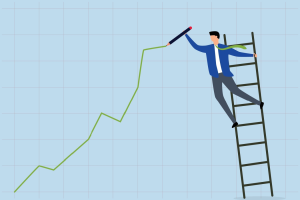
Inflation came in much hotter than expected in February. Core services inflation, which excludes housing, rose 0.5% from January following a 0.9% increase from December. Last month’s gain was twice as fast as it was pre-pandemic, causing the Federal Reserve to rethink interest cutting rate too soon.
Consumer spending is weakening as real disposable income fell in January. At the same time, household debt hit an unsustainable $17.5 trillion. Credit card and auto loan debt is also at record levels and rising, even as personal savings remain weak.
In short, individual finances are a disaster, and the likelihood of a recession sometime this year is high. Now is the time to steel your portfolio against what is to come. The following three companies are stocks to buy for a recession, as they offer resiliency and downside protection.
Walmart (WMT)

In an economic crisis, consumers will shop where they can find everyday low prices. That means retail king Walmart (NYSE:WMT) will shine. Since going public in 1970, the retailer has been through seven recessions and come out stronger each time. WMT stock has gone on to hit new highs each time afterward.
Since its IPO, Walmart’s total return has been astounding. Had you invested $5,000 at the beginning and held on, your grubstake would today be worth over $74 million. If a recession hits in 2024, investors can expect more of the same.
Walmart operates about 4,700 stores in the U.S., with 255 million weekly customers in-store and online. Sales rose 6% last year to $648 billion as same-store sales jumped 5.6% year over year excluding fuel sales. What many investors don’t realize is Walmart is becoming a large advertising platform too. The business grew 28% last year hitting $3.4 billion. The retailer is targeting $6 billion in ad sales by next year.
With operating income surging 32% in 2023, Walmart is a well-oiled machine hitting on all cylinders, and its stock can protect your portfolio in the event of a recession. Walmart also pays a dividend that yields 1.36%, further juicing your portfolio.
Netflix (NFLX)

Streaming video giant Netflix (NASDAQ:NFLX) hasn’t been through as many recessions as Walmart, but it came out of the 2008 financial crisis in fine form and was a stellar stock during the pandemic.
It stands to reason NFLX would hold up well during a downturn because consumers cut back on other pricier forms of entertainment. Staying home and watching movies is a relatively affordable way to make it through hard times. And Netflix emerged significantly stronger from the last recession as most other video streaming platforms either lost money, subscribers or both. There is an industry shakeout coming, and Netflix will remain on top.
The streamer has over 260 million paid subscribers, the largest base in the entertainment industry, both here and globally. Disney (NYSE:DIS) continues to lose subscribers for Disney+ and has lost billions of dollars since its inception. Although fourth-quarter losses were down to $138 million suggesting profitability was finally in sight, it still badly trails Netflix.
NFLX stock doubled over the past year, but with analysts forecasting 23% earnings growth for the next five years Netflix remains a stock to buy for a coming economic upheaval.
Abbott Labs (ABT)

Healthcare company Abbott Labs (NYSE:ABT) has been through just as many recessions as Walmart and also thrived each time. In particular, during the COVID outbreak, sales of Abbott’s testing kits soared, leading the stock to new all-time highs.
While the mania from that period has eased significantly bringing ABT stock back to earth somewhat, the fact remains that healthcare stocks are especially resilient because people can’t go without their medicine or devices. Even though revenue fell 8% last year because of fewer COVID tests sold, it still sold over $1.5 billion-worth globally. Total revenue came in at $40.1 billion. Abbott projects organic sales in 2024, excluding Covid tests, to rise 8% to 10% this year.
Abbott makes a full range of diagnostic products, nutritional products, pharmaceuticals and medical devices. ABT stock has generated a stunning total return since its 1978 IPO. The dividend yields 2% annually, but Abbott has grown the payout at a compounded annual growth rate of nearly 10% over the past decade. With a 52-year record of hiking its dividend, earning it Dividend King status, ABT stock earns a place in your recession-resistant portfolio.
On the date of publication, Rich Duprey did not hold (either directly or indirectly) any positions in the securities mentioned in this article. The opinions expressed in this article are those of the writer, subject to the InvestorPlace.com Publishing Guidelines.




